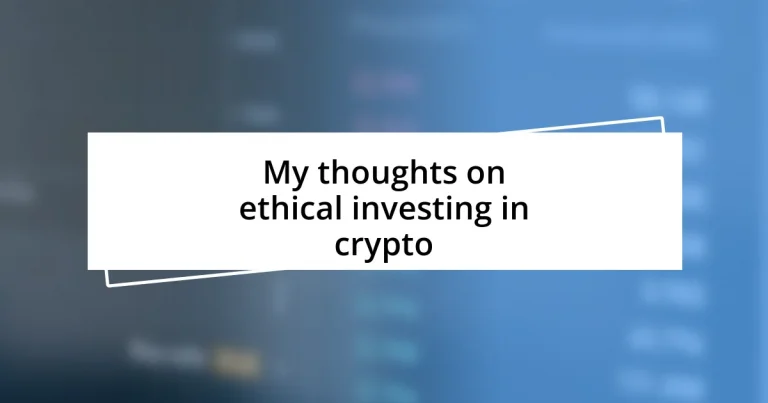Key takeaways:
- Ethical investing prioritizes aligning financial choices with personal values, emphasizing transparency and accountability in companies.
- Key concerns in cryptocurrency include environmental impact, potential for fraud, and financial inclusion, highlighting the need for due diligence.
- Future trends in ethical crypto focus on social responsibility, traceability of transactions, and collaborations with environmental organizations to drive positive change.
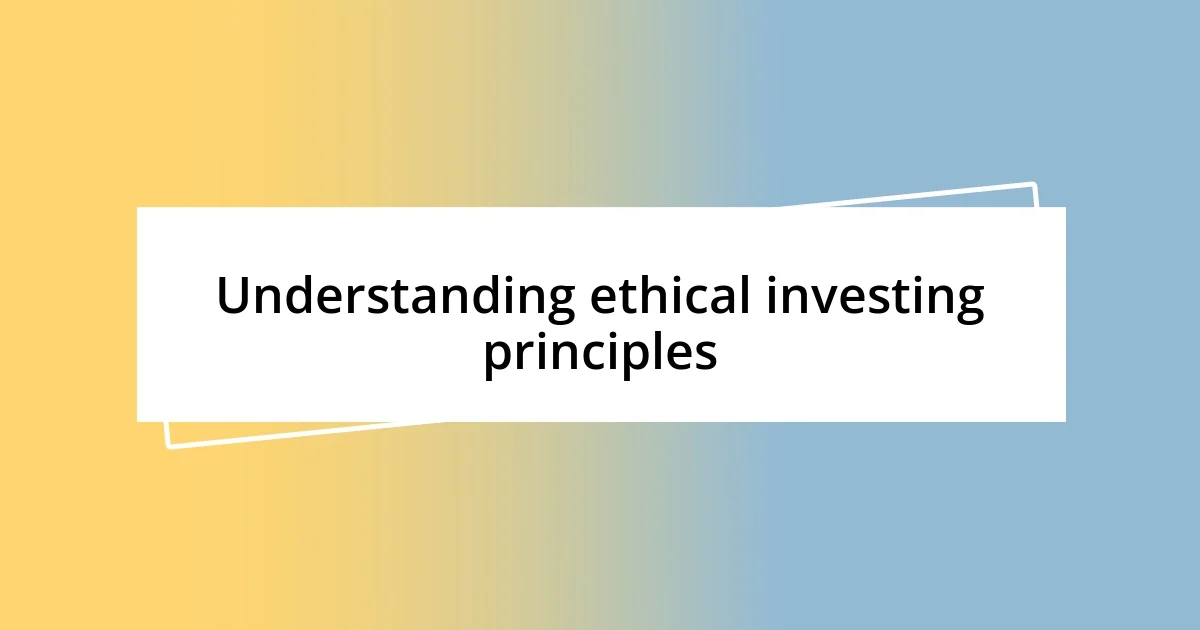
Understanding ethical investing principles
Ethical investing revolves around the idea of aligning financial choices with personal values. When I first began my investment journey, I still remember the moment I realized that my money could impact social and environmental issues. How powerful is it to know that every dollar spent or invested can contribute to positive change in the world?
At its core, ethical investing often emphasizes transparency and accountability from companies. Reflecting on my own experiences, I’ve encountered firms that proudly showcase their sustainable practices. It’s refreshing to support businesses that not only aim for profit but also commit to making a meaningful difference. It prompts me to think—can investing be both financially rewarding and morally fulfilling?
These principles can sometimes feel overwhelming because they require research and careful consideration. I vividly recall diving deep into the values of various companies before making decisions. It can be time-consuming, but the reward of understanding where my investments align with my beliefs is incredibly satisfying. Isn’t it reassuring to invest knowing that you’re supporting a cause you believe in?
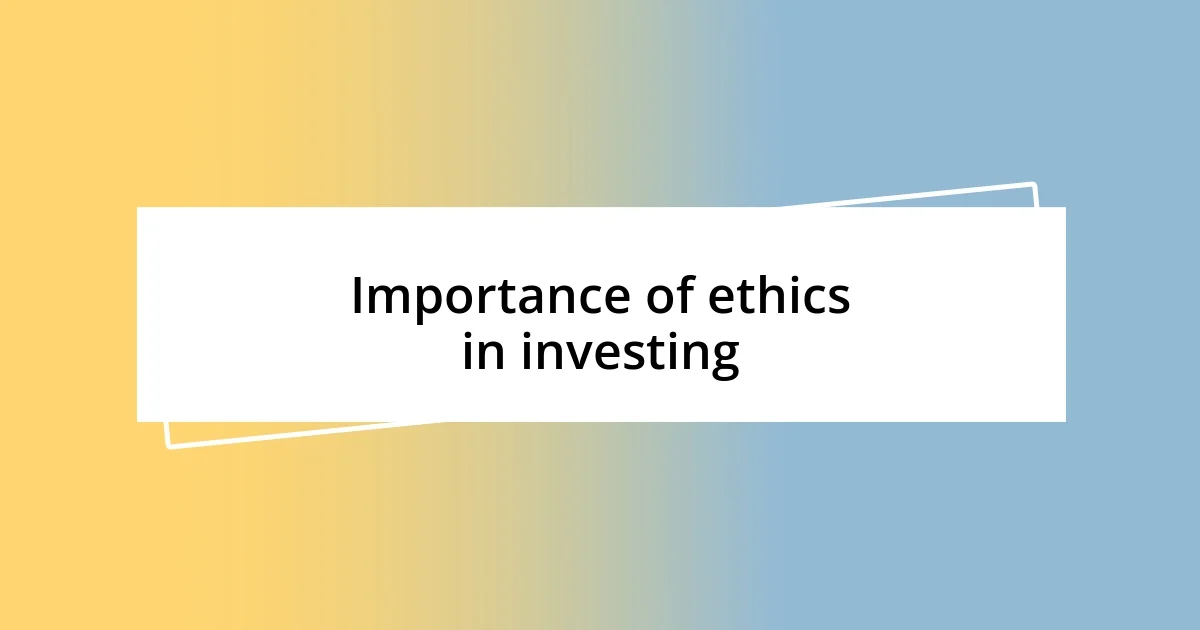
Importance of ethics in investing
Ethics in investing is crucial because it determines not only where our money goes, but also what kind of impact it creates in the world. I often think about how my investments reflect my identity; I want to be part of something that promotes sustainability and social justice. Each time I choose to support a company committed to ethical practices, it feels like a step towards shaping a more responsible market.
Here are a few reasons why ethics matter in investing:
– Trust and credibility: Ethical companies tend to foster trust with consumers, which can lead to long-term success.
– Risk mitigation: Investing in ethical businesses can reduce risks associated with scandals or poor practices that might harm a company’s stock prices.
– Market demand: There’s a growing trend among consumers who prefer brands with strong ethical values, driving profitability for responsible companies.
– Personal fulfillment: Aligning investments with your values can lead to greater satisfaction and happiness, knowing you’re contributing to causes that matter to you.
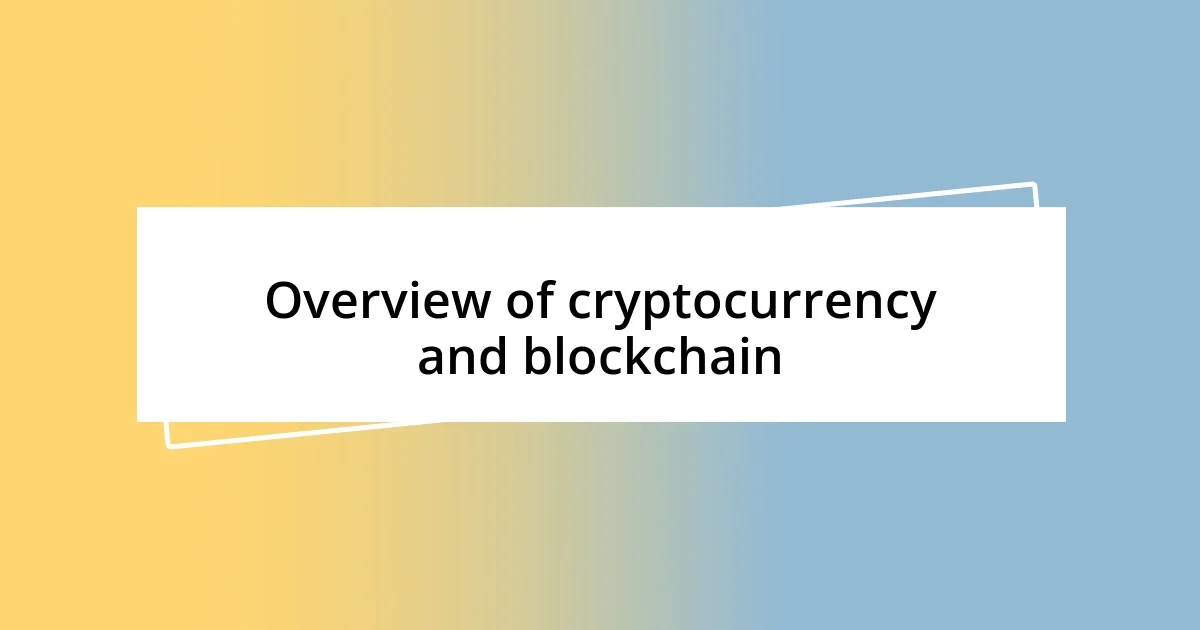
Overview of cryptocurrency and blockchain
Cryptocurrency and blockchain technology are fascinating innovations that have transformed the financial landscape. At its essence, cryptocurrency is a digital asset that uses cryptography for secure transactions. The allure for me lies in its decentralized nature, which means no single entity controls it. This decentralization empowers individuals and encourages financial autonomy, aligning closely with my beliefs about personal financial freedom.
The foundation of cryptocurrencies is blockchain—a distributed ledger that records transactions across many computers. This technology enhances transparency and security, as changes to the ledger must be agreed upon by consensus. I remember my initial skepticism about blockchain; it felt complex and intimidating. However, once I understood how it creates trust without intermediaries, I started to see its potential to revolutionize various industries, including finance.
As I explore the world of crypto, I can’t help but appreciate the innovative spirit it embodies. It encourages creativity and pushes boundaries in how we think about money and value. It sparked my curiosity: How can blockchain create systems that prioritize ethical considerations? I think the intersection of these technologies with ethical investing holds incredible promise for a future that values both growth and responsibility.
| Aspect | Cryptocurrency |
|---|---|
| Description | Digital assets using cryptography for secure transactions |
| Key Feature | Decentralization, allowing individual control and autonomy |
| Technology | Based on blockchain, a distributed ledger for transparency |
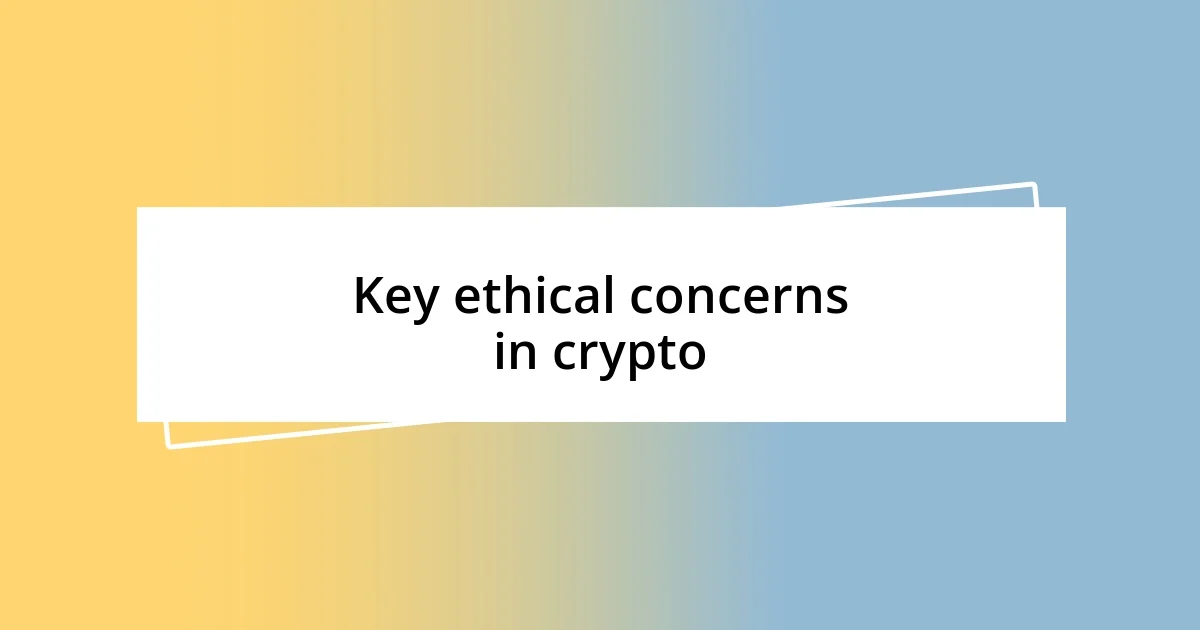
Key ethical concerns in crypto
One of the most pressing ethical concerns in crypto is its environmental impact. There’s no denying that mining cryptocurrencies, particularly Bitcoin, consumes enormous amounts of energy, leading to a substantial carbon footprint. When I first learned about this, it left me feeling conflicted—investing in something that promises decentralization and autonomy, while contributing to ecological degradation seemed hypocritical. Have you ever considered how your investments affect the planet?
Another key concern is the potential for fraud and mismanagement within the crypto space. The anonymity and lack of regulation can create breeding grounds for scams and Ponzi schemes, leaving unsuspecting investors in the lurch. I remember a close friend sharing his experience of losing money to a shady project. It made me realize that while crypto can offer incredible opportunities, it’s crucial to exercise due diligence and remain vigilant. How can we protect ourselves while still exploring this innovative frontier?
Finally, I often worry about the financial inclusion narrative that surrounds cryptocurrencies. While crypto has the power to empower unbanked populations, it’s not a universal solution. Many individuals still lack access to technology or the necessary knowledge to engage with digital currencies effectively. Reflecting on this, I ask: Are we truly democratizing finance, or are we just creating a different form of exclusivity? It’s essential for us to continue questioning and addressing these concerns as we navigate the complex landscape of ethical investing in crypto.
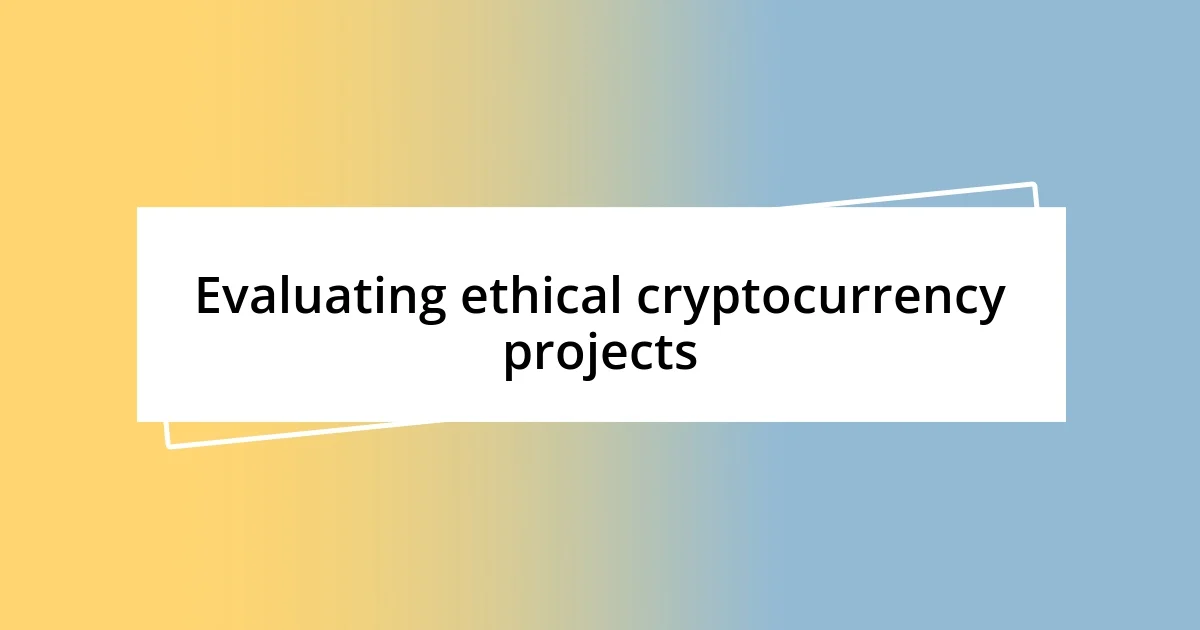
Evaluating ethical cryptocurrency projects
When evaluating ethical cryptocurrency projects, I find it crucial to assess the project’s mission and values. For instance, I came across a project focused on sustainable energy use in mining processes, which instantly resonated with my commitment to environmental preservation. Does the project aim to create social impact alongside financial returns? That’s the kind of alignment I look for in my investments.
Another aspect worth considering is the transparency of the project team. I remember being drawn to one particular cryptocurrency because the founding members regularly shared their progress and challenges on public forums. This openness sparked a sense of trust in me. How transparent is the information provided? If a project hides behind a curtain of anonymity, I become more skeptical about its ethical standing.
Lastly, community engagement plays a significant role in my evaluation. A project that actively involves its user base in decision-making feels more ethical to me. I was captivated by an online discussion where community members voiced their opinions on the project’s direction. It reminded me of how critical collaboration is in ensuring that the crypto space remains accountable. Are we contributing to a community—or just investing in a potentially isolating venture? That’s the question I keep returning to as I navigate this financial landscape.
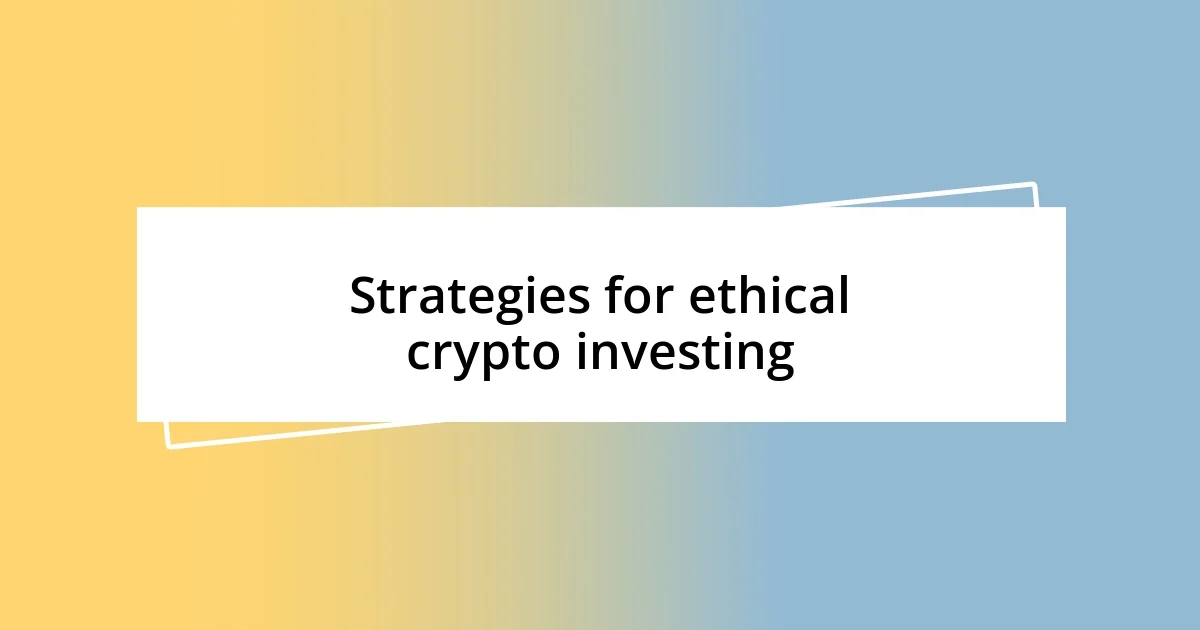
Strategies for ethical crypto investing
A key strategy for ethical crypto investing is to prioritize projects that actively focus on sustainability. I remember my excitement when I stumbled upon a platform that offsets its carbon emissions by investing in renewable energy initiatives. This kind of commitment made me feel like I was not just throwing money into the crypto void; rather, I was part of a movement that genuinely seeks to mitigate environmental harm. How great would it be to know your investments are contributing to a healthier planet?
Another essential approach is to seek out projects with robust governance structures. I can’t help but think back to a cryptocurrency forum I participated in where investors shared insights about a community-driven project. The way they collaborated on decisions brought a sense of purpose and accountability. Wouldn’t it be reassuring to invest in projects that actively listen to their communities? This factor is vital, as it speaks to a project’s ethical foundation and its long-term viability.
Lastly, staying informed about regulatory developments can’t be overlooked. When I started following new regulations, it dawned on me how vital they are for protecting investors and ensuring fair practices. It felt empowering to understand the legal landscape better; I was finally able to identify which projects aligned with my ethical standards. With this knowledge in hand, I’m much more confident in making choices that reflect my values. Isn’t it about time we take charge of our investments, not just financially, but ethically?
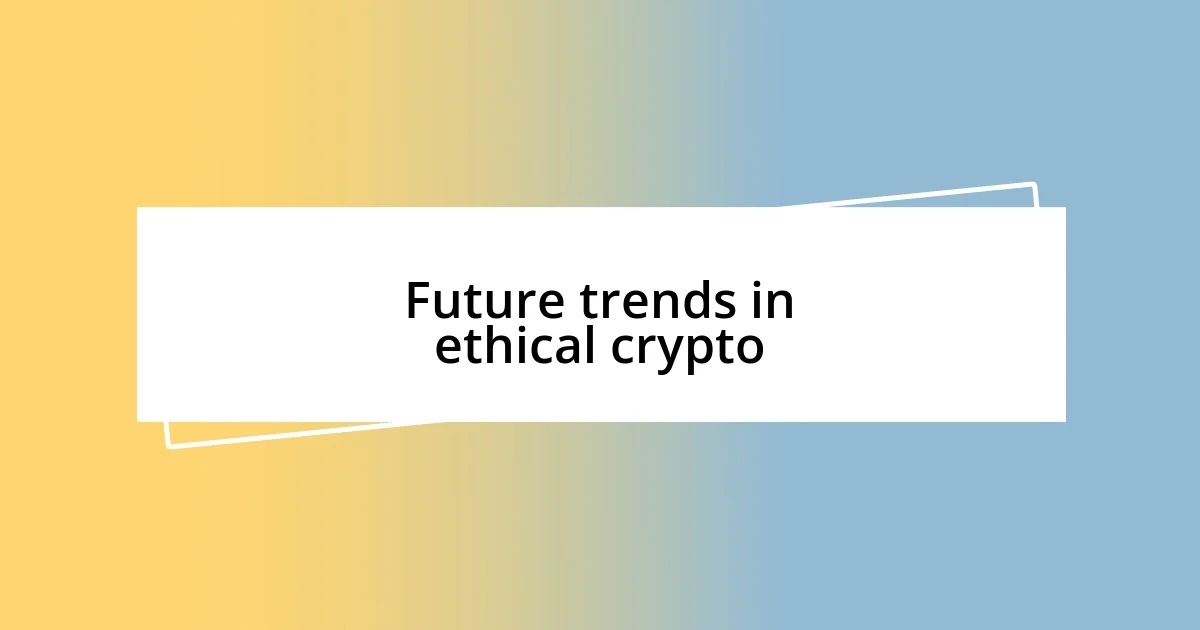
Future trends in ethical crypto
As I look to the future of ethical investing in crypto, I can’t help but feel optimistic about the rise of projects that prioritize social responsibility. Just recently, I discovered a startup focused on democratizing access to financial services through blockchain technology. It resonated with me because it aims to empower unbanked populations—imagine the impact of giving people the tools they need to uplift themselves financially! How exciting is it to think that our investments can help break down barriers for millions?
Another trend I see is an increasing emphasis on the traceability of transactions and the ethical sourcing of cryptocurrency. I remember being amazed by a platform that allows users to track the carbon footprint of their transactions. It was a revelation—being able to understand the environmental impact of my digital currency activities felt like a game changer. Isn’t it refreshing to think we can make informed choices that align with our values, turning our financial habits into a catalyst for good?
Moreover, collaborations between tech companies and environmental organizations are on the rise. I was particularly moved by a partnership I read about that combined the power of blockchain with wildlife conservation efforts. The project aimed to track poaching activity in real-time, offering a direct way for investors to contribute to saving endangered species. Doesn’t it make investing feel more meaningful when we can see our funds working toward a cause that truly matters? It’s trends like these that motivate me to engage with and support ethical crypto initiatives.












